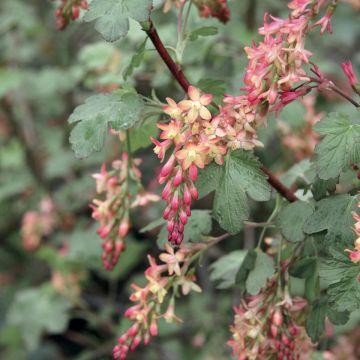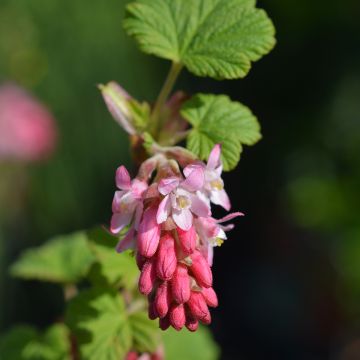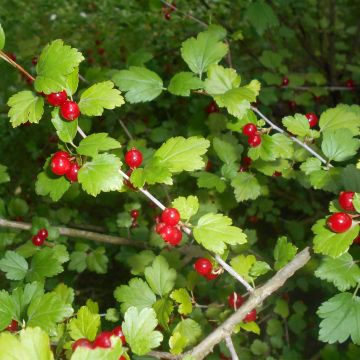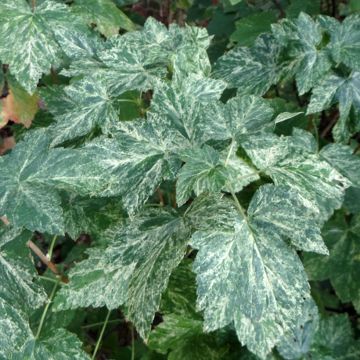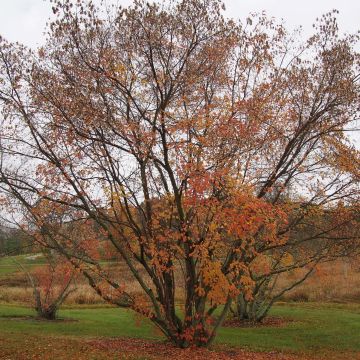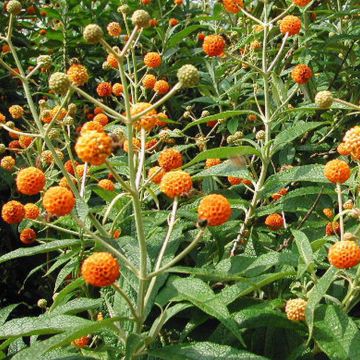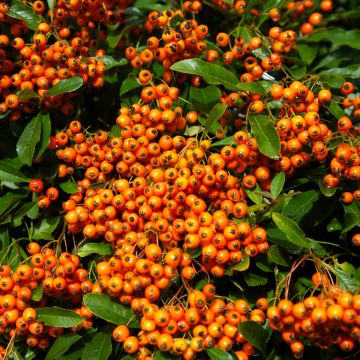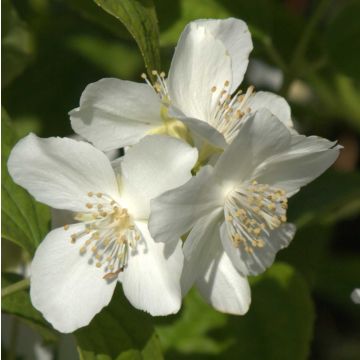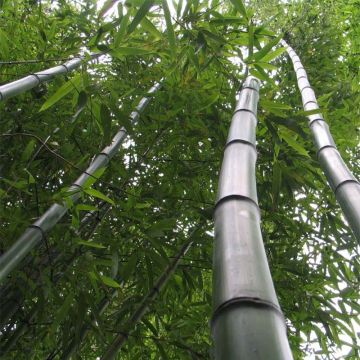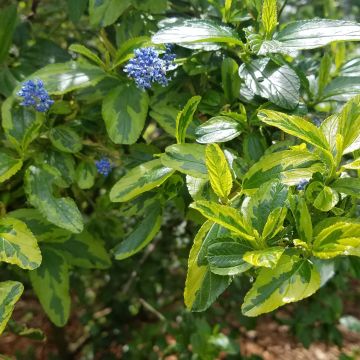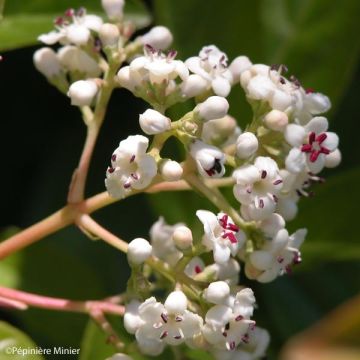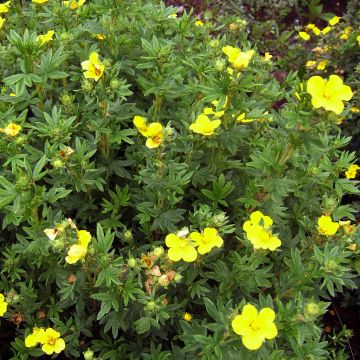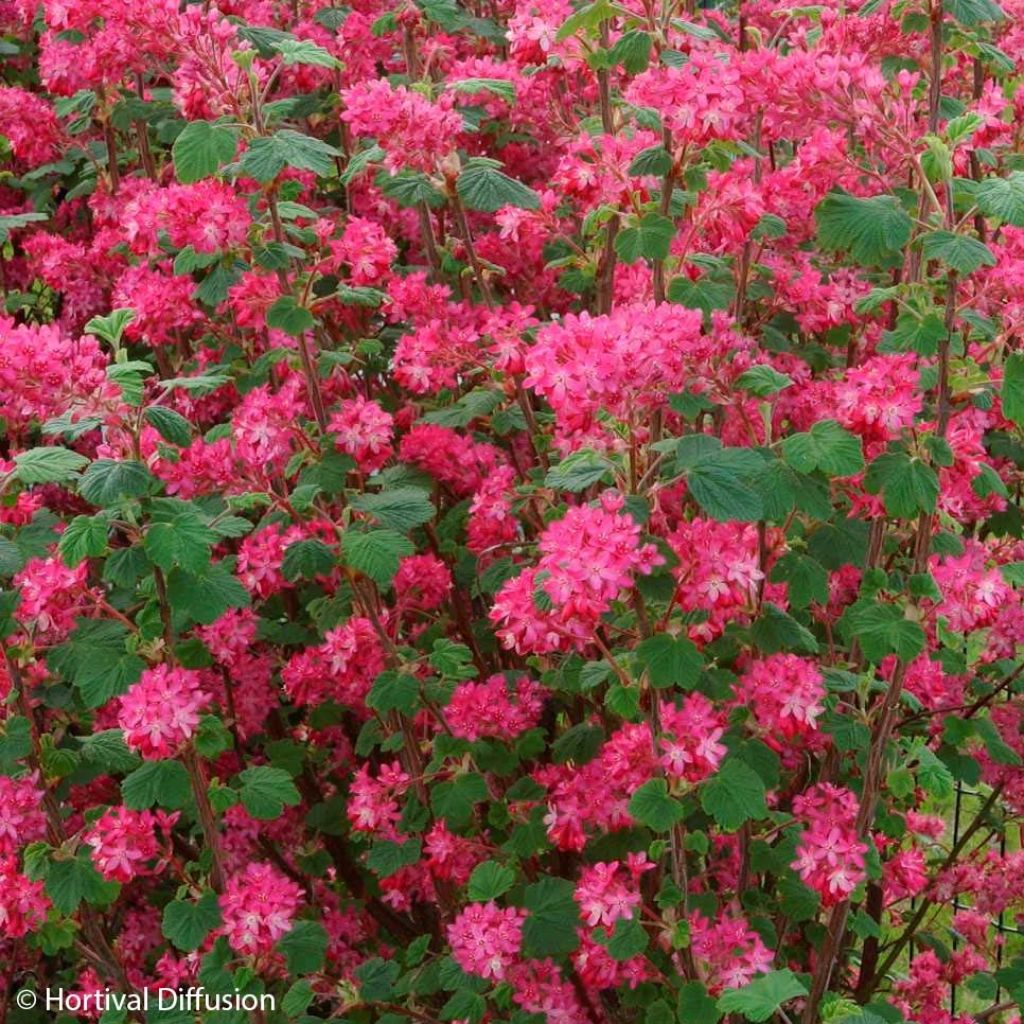

Ribes sanguineum Red Bross - Flowering Currant
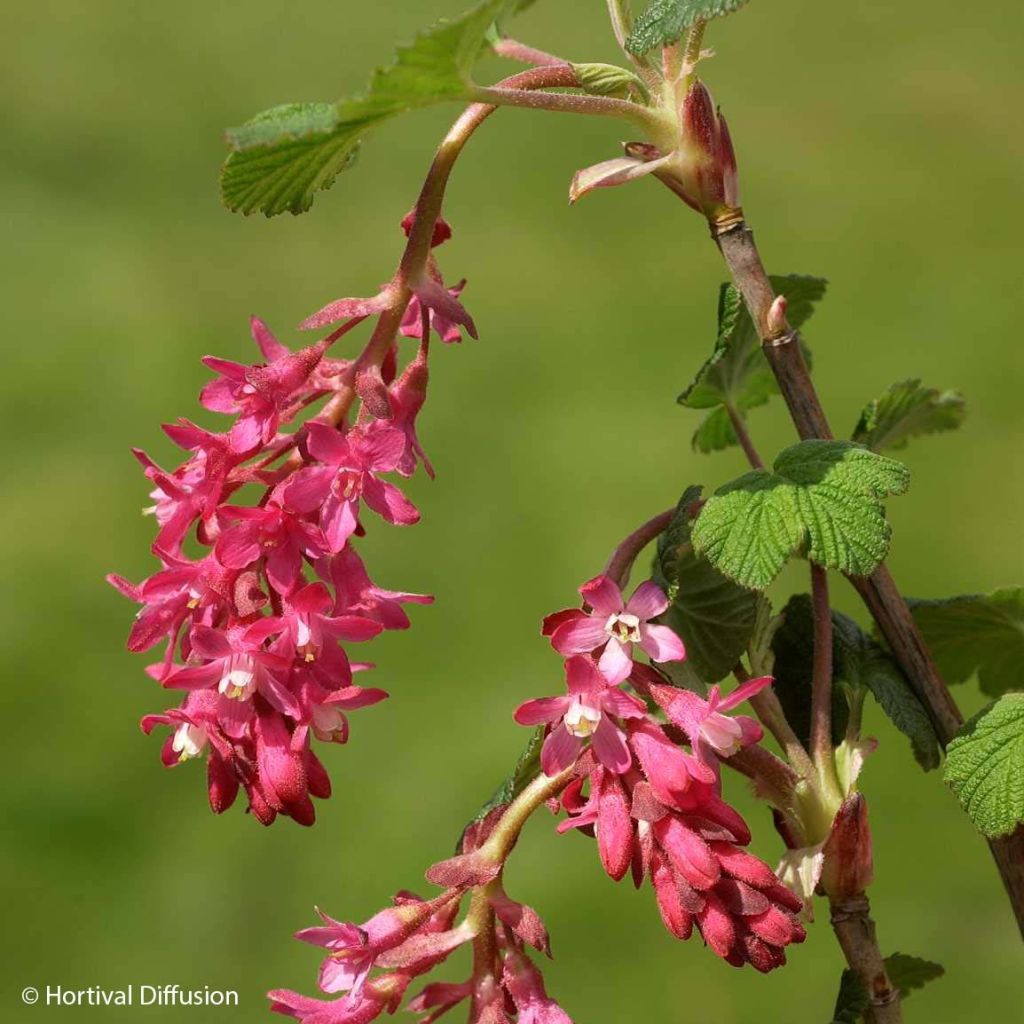

Ribes sanguineum Red Bross - Flowering Currant
Ribes sanguineum Red Bross - Flowering Currant
Ribes sanguineum Red Bross®
Flowering Currant, Red-flowered Currant, American Currant, Blood Currant
Special offer!
Receive a €20 voucher for any order over €90 (excluding delivery costs, credit notes, and plastic-free options)!
1- Add your favorite plants to your cart.
2- Once you have reached €90, confirm your order (you can even choose the delivery date!).
3- As soon as your order is shipped, you will receive an email containing your voucher code, valid for 3 months (90 days).
Your voucher is unique and can only be used once, for any order with a minimum value of €20, excluding delivery costs.
Can be combined with other current offers, non-divisible and non-refundable.
Home or relay delivery (depending on size and destination)
Schedule delivery date,
and select date in basket
This plant carries a 24 months recovery warranty
More information
We guarantee the quality of our plants for a full growing cycle, and will replace at our expense any plant that fails to recover under normal climatic and planting conditions.
Would this plant suit my garden?
Set up your Plantfit profile →
Description
Ribes sanguineum Red Bross is a rather late flowering variety of currant bush, vigorous and floriferous, with flowers of a particularly pronounced red colour. It is a deciduous and very hardy shrub, whose spring flowers and light green foliage, release a sweet aroma of blackcurrant, which has earned it its other name of "False Blackcurrant". Place it in a flowering hedge, mixed with other shrubs that flower at different times or simultaneously.
The 'Red Bross' Blood Currant, obtained by Minier nurseries in 2004, is a cultivar derived from Ribes sanguineum and belongs to the Grossulariaceae family. The western United States is the birthplace of this particularly robust shrub. It is found mainly on rocky and wooded slopes from southern California to the northwest of the United States. 'Red Bross' will reach about 3 m (9 ft 10 in) in height and spread over 2 m (6 ft 7 in), its growth is fast. It has an upright and bushy growth habit. In April-May, after the leaves have unfolded, clusters of small bright red flowers with a white eye appear, measuring about 8 cm (3.1 in) long. This fragrant flowering, so welcome in spring, follows that of the classic Forsythia. The flowers are followed in August by the formation of small, round fruits that turn bluish then black and chalky, which birds love. The light green leaves are 5 to 10 cm (2 to 3.9 in) long, and have five shallow irregularly dentate lobes. They give off a delicious blackcurrant fragrance when crushed. The branches of this deciduous shrub are bare of leaves in winter.
The 'Red Bross' Blood Currant will find a place in all gardens, in an informal hedge, shrub beds, or even as a standalone specimen. It has a lot of presence when grown in a container. In addition to its association with Forsythia, which is classic and charming, you can plant it in a spring scene with Exochorda, early lilacs, Chinese almond tree Prunus triloba, or even the Japanese apricot tree. Planted in mixed groups of three or four, Flowering Currants create an effect that stands out, especially at the back of perennial beds. Finally, to fully enjoy its flowers and fragrance, you can cut flowering branches for bouquets.
Report an error about the product description
Ribes sanguineum Red Bross - Flowering Currant in pictures
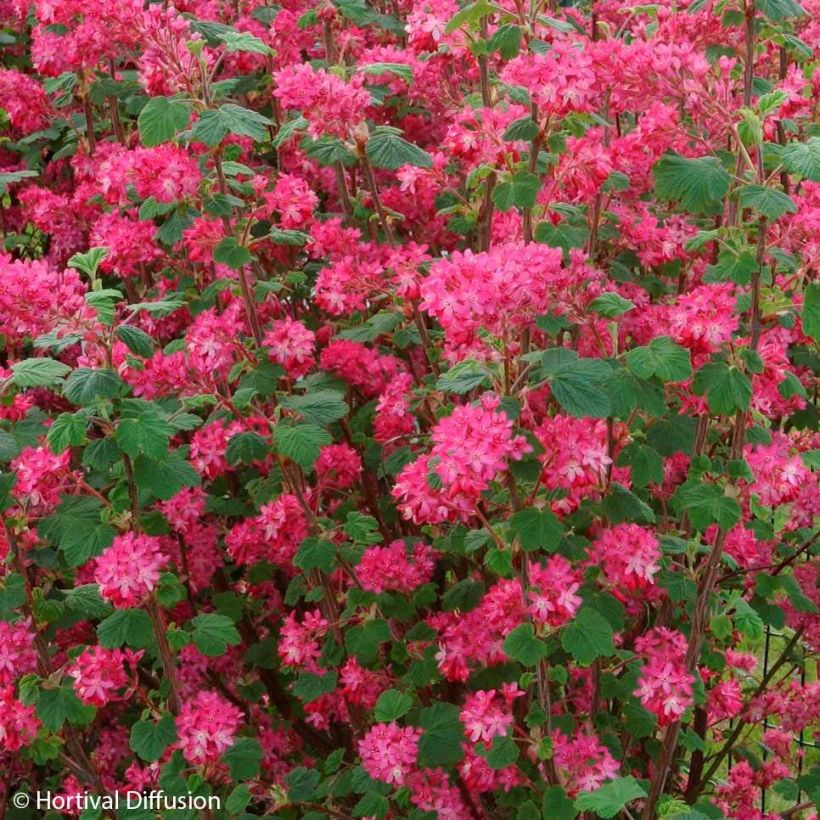

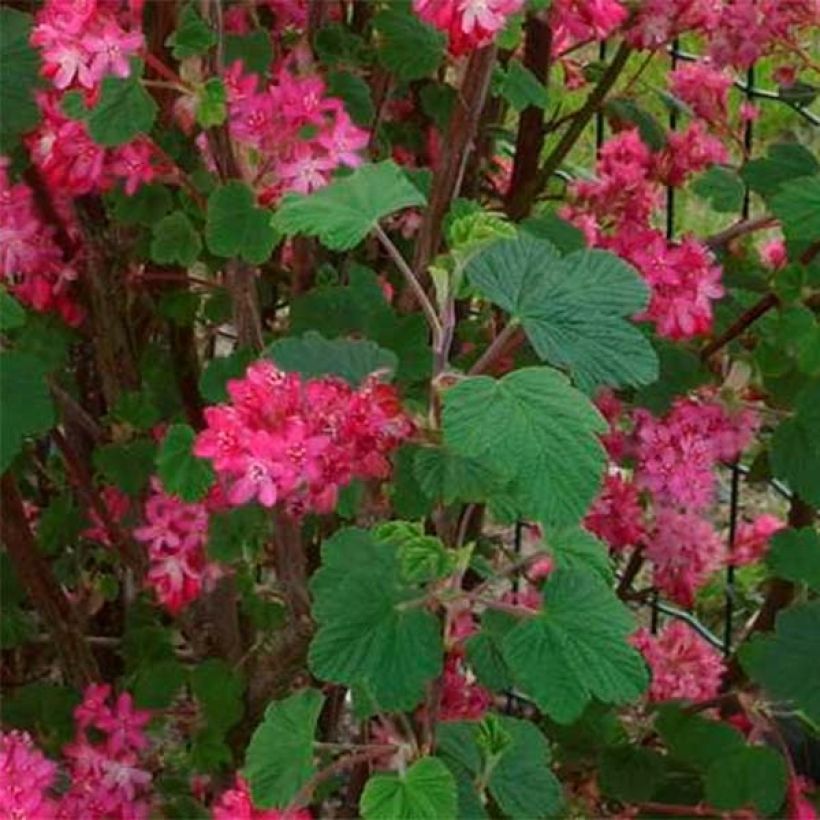

Plant habit
Flowering
Foliage
Botanical data
Ribes
sanguineum
Red Bross®
Grossulariaceae
Flowering Currant, Red-flowered Currant, American Currant, Blood Currant
Cultivar or hybrid
Other Ribes - Flowering Currants
View all →Planting and care
Plant the 'Red Bross' Flowering Currant in ordinary, deep, even limestone, rich and moist soil. This bush will thrive in partial shade or in the sun, but in a non-scorching exposure. Pruning is not necessary, except to remove dead wood or correct a slightly sparse habit. Prune the branches by one-third of their size after flowering. When planting, bury part of the collar to promote good rooting. Maintenance pruning: if you simply want to maintain the shape of the bush, just remove weak or overly arched branches and dead wood. Rejuvenation pruning: for subjects that have become too bulky or have lost their bushy shape (thinning at the base, sparse branches), it is advisable to prune the branches to 50 cm (19.7 in) from the ground. This can be done all at once (rigorous pruning, for older subjects) or over 3 years (then only prune one-third of the branches each year, ensuring a balanced appearance for the bush). The bush will then form new shoots.
Planting period
Intended location
Care
This item has not been reviewed yet - be the first to leave a review about it.
Similar products
Haven't found what you were looking for?
Hardiness is the lowest winter temperature a plant can endure without suffering serious damage or even dying. However, hardiness is affected by location (a sheltered area, such as a patio), protection (winter cover) and soil type (hardiness is improved by well-drained soil).

Photo Sharing Terms & Conditions
In order to encourage gardeners to interact and share their experiences, Promesse de fleurs offers various media enabling content to be uploaded onto its Site - in particular via the ‘Photo sharing’ module.
The User agrees to refrain from:
- Posting any content that is illegal, prejudicial, insulting, racist, inciteful to hatred, revisionist, contrary to public decency, that infringes on privacy or on the privacy rights of third parties, in particular the publicity rights of persons and goods, intellectual property rights, or the right to privacy.
- Submitting content on behalf of a third party;
- Impersonate the identity of a third party and/or publish any personal information about a third party;
In general, the User undertakes to refrain from any unethical behaviour.
All Content (in particular text, comments, files, images, photos, videos, creative works, etc.), which may be subject to property or intellectual property rights, image or other private rights, shall remain the property of the User, subject to the limited rights granted by the terms of the licence granted by Promesse de fleurs as stated below. Users are at liberty to publish or not to publish such Content on the Site, notably via the ‘Photo Sharing’ facility, and accept that this Content shall be made public and freely accessible, notably on the Internet.
Users further acknowledge, undertake to have ,and guarantee that they hold all necessary rights and permissions to publish such material on the Site, in particular with regard to the legislation in force pertaining to any privacy, property, intellectual property, image, or contractual rights, or rights of any other nature. By publishing such Content on the Site, Users acknowledge accepting full liability as publishers of the Content within the meaning of the law, and grant Promesse de fleurs, free of charge, an inclusive, worldwide licence for the said Content for the entire duration of its publication, including all reproduction, representation, up/downloading, displaying, performing, transmission, and storage rights.
Users also grant permission for their name to be linked to the Content and accept that this link may not always be made available.
By engaging in posting material, Users consent to their Content becoming automatically accessible on the Internet, in particular on other sites and/or blogs and/or web pages of the Promesse de fleurs site, including in particular social pages and the Promesse de fleurs catalogue.
Users may secure the removal of entrusted content free of charge by issuing a simple request via our contact form.
The flowering period indicated on our website applies to countries and regions located in USDA zone 8 (France, the United Kingdom, Ireland, the Netherlands, etc.)
It will vary according to where you live:
- In zones 9 to 10 (Italy, Spain, Greece, etc.), flowering will occur about 2 to 4 weeks earlier.
- In zones 6 to 7 (Germany, Poland, Slovenia, and lower mountainous regions), flowering will be delayed by 2 to 3 weeks.
- In zone 5 (Central Europe, Scandinavia), blooming will be delayed by 3 to 5 weeks.
In temperate climates, pruning of spring-flowering shrubs (forsythia, spireas, etc.) should be done just after flowering.
Pruning of summer-flowering shrubs (Indian Lilac, Perovskia, etc.) can be done in winter or spring.
In cold regions as well as with frost-sensitive plants, avoid pruning too early when severe frosts may still occur.
The planting period indicated on our website applies to countries and regions located in USDA zone 8 (France, United Kingdom, Ireland, Netherlands).
It will vary according to where you live:
- In Mediterranean zones (Marseille, Madrid, Milan, etc.), autumn and winter are the best planting periods.
- In continental zones (Strasbourg, Munich, Vienna, etc.), delay planting by 2 to 3 weeks in spring and bring it forward by 2 to 4 weeks in autumn.
- In mountainous regions (the Alps, Pyrenees, Carpathians, etc.), it is best to plant in late spring (May-June) or late summer (August-September).
The harvesting period indicated on our website applies to countries and regions in USDA zone 8 (France, England, Ireland, the Netherlands).
In colder areas (Scandinavia, Poland, Austria...) fruit and vegetable harvests are likely to be delayed by 3-4 weeks.
In warmer areas (Italy, Spain, Greece, etc.), harvesting will probably take place earlier, depending on weather conditions.
The sowing periods indicated on our website apply to countries and regions within USDA Zone 8 (France, UK, Ireland, Netherlands).
In colder areas (Scandinavia, Poland, Austria...), delay any outdoor sowing by 3-4 weeks, or sow under glass.
In warmer climes (Italy, Spain, Greece, etc.), bring outdoor sowing forward by a few weeks.






























